An ongoing and occasional series on a 3-month trip I took to India in 1982. I was 25, and traveled by train across the country alone, writing an article on the then-unknown Indian film industry and combating the anxieties of youth and solo travel. Often includes references to what I wore. I kept journals, and abstract them in these page. You can find the previous posts here, and a Google map of the trip, here.
When I was young, we used the idea of “Calcutta” as an archetype for any poverty. But in April of 1982, after weeks traveling the rest of India, Calcutta itself felt like recognizable civilization. Bookstores everywhere. People impassioned about the tradition of Bengali poetry and film. And despite the city’s physical decay, entrepreneurs all around.
Once I recovered from the rogue bacteria of my train ride up the coast, I scheduled a phone interview with Mrinal Sen. I asked simple questions, he gave complex answers. As experts do.
I also took care of a few tasks that cities permit, taking tuk-tuks and bicycle rickshaws around looking for English-language books,
and visiting the post office.
This man made a living by mailing other people’s stuff. For the illiterate, he wrote addresses. For the busy, he navigated post office bureaucracy and delays. I asked him to post a bottle of Ayurvedic massage oil to a friend in New York. She told me later it arrived, smashed to bits. I couldn’t explain to her why that was really OK. My explanation would have been too bound up in the man’s skin condition, his slicked back hair and black umbrella. I would have needed economic theory to explain cost of labor, the suffering of clerks, and the optimism of small businesses everywhere.
Then things got very blue.
I took an airplane to the Andaman Nicobar Islands. We landed on a strip in the middle of a prickly field.
I wasn’t supposed to take pictures, the soldiers told me, all uniformed as they were.
I had reservations at the only Western hotel on the island. A Sheraton, if I remember, still under construction. On the edge of a very blue sea.
The rooms were little cabins, each with their own entry to the tropical out of doors. I ate in the large, palm-frond covered, open air restaurant. The only other people at the hotel were Texans, there to map the bottom of the Indian Ocean in the developed world’s undying and fatal search for oil. But they left me alone, their collegial endeavor more compelling than one traveling girl.
I heard them laugh, I remember the sound of clinking glasses. I wrote,
I have been very glad to spend these four days on the island. Not to move more than a few feet in the morning, from bed to table to deck chair. This hotel room is beautiful, wood floors, handmade bedspreads, and fresh flowers every morning. Why do I feel so small?
Looking back, I see that this stay was my vacation from the India trip, and I wanted it to resemble vacations in developed nations. The sound of jackhammers, from the ongoing construction, began to drive me nuts. I went to the hotel desk, and asked, “Can someone tell me where to find quiet?” Someone could. They assigned a staffer, Matthew. He took me down to the dock, where we got into a little motor boat. Over the blue sea we went to the next island.
It was empty.
I mean, empty. The island had been a pineapple plantation for years. Was now reverting to itself. We walked on wheel tracks. The luxury of beaches is as much about what isn’t there as what is.
I sat on a rock for a while, Matthew under the trees. I swam. We didn’t talk. The horizon had returned and I could see things from a distance. It’s much better to feel small under a big sky than surrounded by people you don’t know and a civilization you don’t understand. Quiet is far less isolating when there’s no one you need to talk to, but someone’s there just in case.
I was beginning to understand not only India, but my own loneliness. I wrote,
I miss being loved. I want never to have to make an effort again or try or have hassles. I am worn to the breaking point from planning and arranging. I can’t schedule another thing. I just want to find someone to take me on a hike through beautiful mountains, feed me, and put me in a sleeping bag at night.
I never want to hear another regretful Indian voice tell me, “No madame, it is not possible.” When I get back to the US, I am never again going to refrain from saying, “Take care of me.” To hell with always taking the difficult way.
The hard part is to make it look easy. The best way to make it look easy is for actually to be easy. The puritan curse of believing that easy is evil, lady. Easy is smart. Lisa, from now on say to yourself twelve times a day, “Easy is smart, easy is smart, easy is smart.”
I am only now, at 54 going on 55, understanding what my 25-year old self said on a beach, in the middle of the Andaman sea, on a retired pineapple plantation. Easy doesn’t mean no work, easy means using the majority of your talents well, in the company of people who support you.
We took the boat back. On the dock a fisherman mended his nets with his toes, the sea behind, persisting in blue and calm.
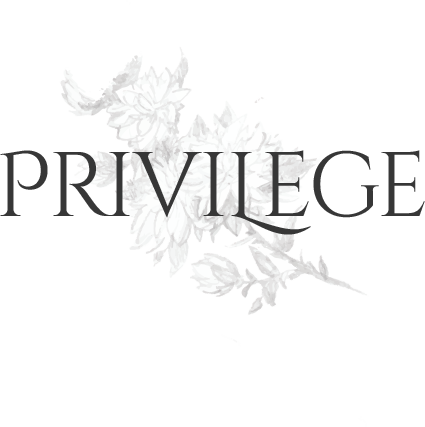
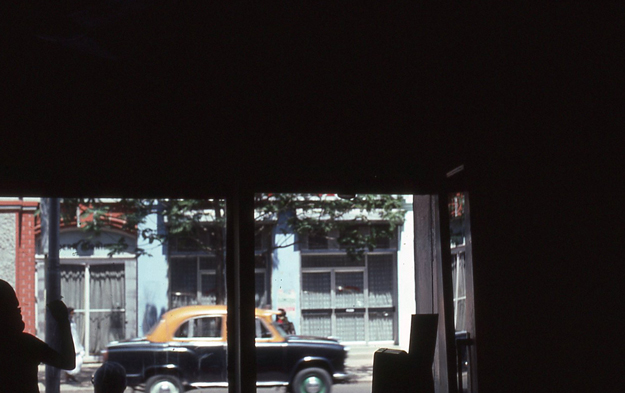
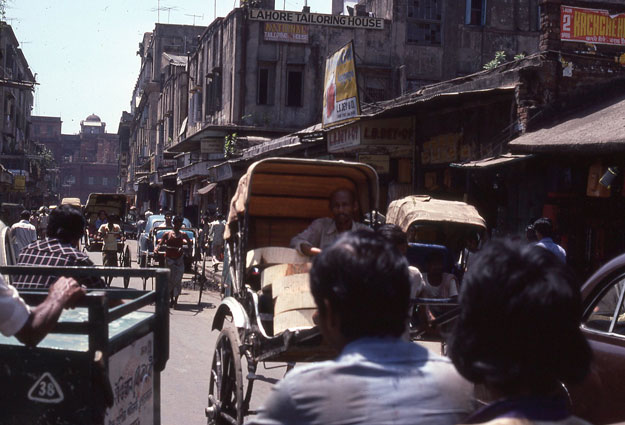
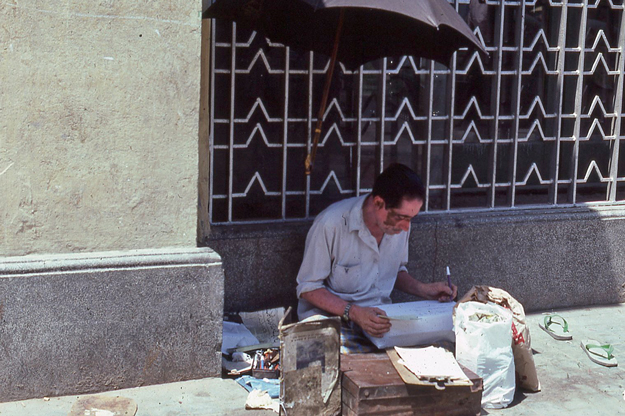
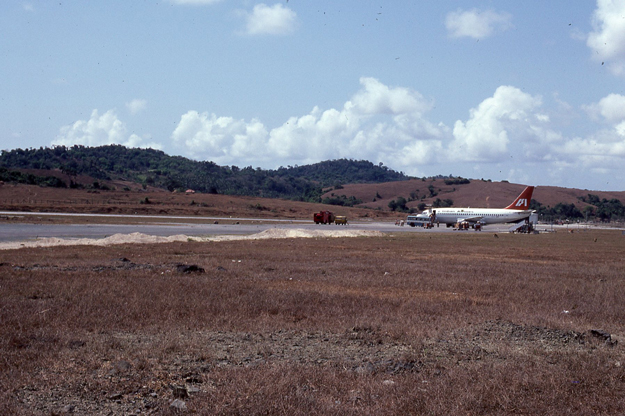
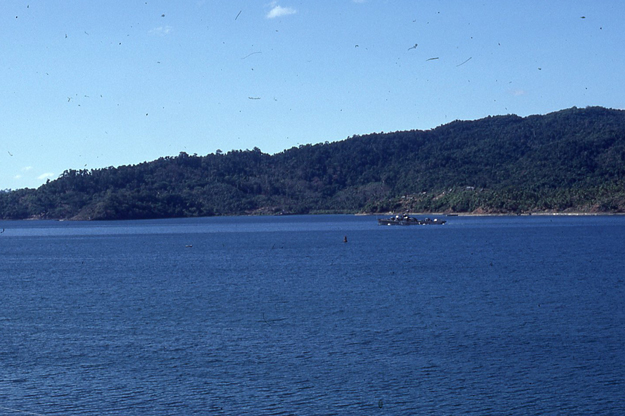
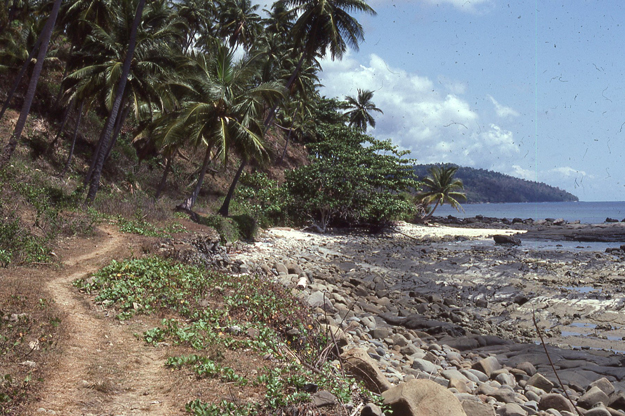
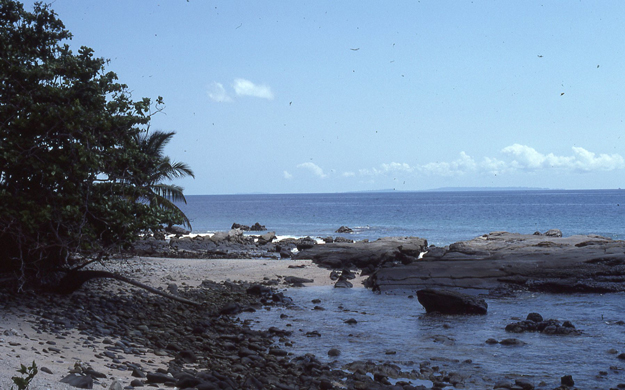
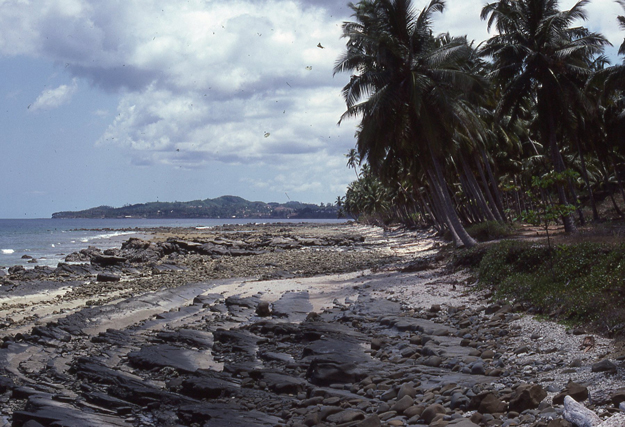
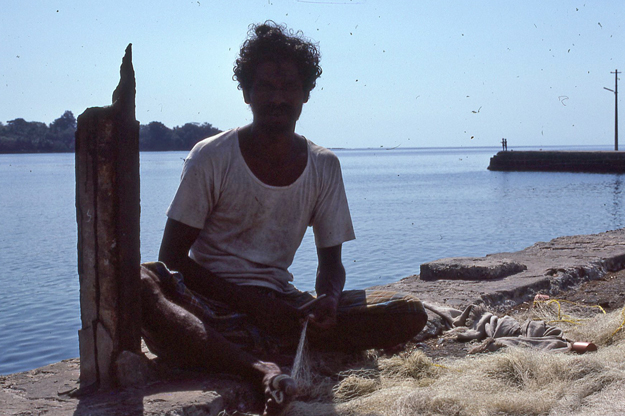
32 Responses
I love the posts from this series. So glad you kept a journal and can share some of the wisdom learned and now re-ordered from this amazing trip.
Your summary of what easy means is a good one. I always look forward to the last sentence or two of your posts, knowing there’ll be a deft touch of awareness or intelligence in what I find there, and knowing that I mustn’t skip straight to it, as the rest of the post unfolds intricately toward a conclusion that only you could bolster so adroitly.
Thank you for this posting!
One of my favorite posts
“I asked him to post a bottle of Ayurvedic massage oil to a friend…”
Gracious! The synchronicity between our clans is striking this morning. Just before reading your latest entry containing the above excerpt, I had turned to my niece’s blog, and read this entry:
“One of the primary treatments for anyone experiencing a vata imbalance is abhyanga, the soothing oil treatment I learned at Vaidyagrama. While abhyanga is often translated as oil massage, a better translation is oil application. In Sanskrit, Abhy means ‘every’ and anga means ‘limb’ or ‘part,’ referring to the application of oil to every body part. Massage is less important than completely covering the body, as oil has a direct calming effect on the tissues. Abhyanga effectively replenishes the buffer between the inside and outside world and quiets the nervous system.”
http://ayurvedaintranslation.wordpress.com/
May you both continue to delight and inform with your marvelous generosity of spirit!
What a brave adventuress you were! Thanks again for sharing the highlights of such an important trip. As usual, there is so much wisdom in your posts.
Lisa, it’s always a treat reading your India posts. As for using the majority of your talents well among people who support you, I would call that practical and wise, not easy, but I understand what you mean, and I definitely know what you mean about the puritan curse. Too often the message of “work” makes us work against ourselves.
The words are like poetry, I love that! Talented young woman, had no idea of the adventures of life to come.
“Easy doesn’t mean no work, easy means using the majority of your talents well, in the company of people who support you.”
Lisa, I love your definition of easy.
Thank you for sharing your wisdom.
What Mise said.
Would that I could weave with words as well as the two of you.
India is my goal.
I wish I had gone when I was younger and braver and not claustrophobic….
I love this series.
xo jane
I like the conversations between your 25-year-old and current selves. This is a very good reason to keep a diary. I continue to think you are very brave for sharing parts of yours here.
Your continuing saga remains quite engaging. You may have answered this question elsewhere on the blog, but is the article you were researching on this trip published or otherwise available as well? I believe it would make an interesting read as an accompaniment to your personal account and reflections.
Thank you for sharing your travelogue with us.
This sounds like a delicious retreat…it is true that easy is easier to understand at our age.
I really loved this post Lisa. I hope there’s more…
xo Mary Jo
Excellent!
Much to think about here. Reading this post brought to mind a friend whose husband was assigned to his company’s offices in Bangalore for three years. She and their children accompanied him. It has been a beautiful, frustrating, infuriating time for her, and she is, six months out from an anticipated transfer to France (like Paradise after purgatory), counting down the weeks and days. She has taken to scheduling European vacations for their family simply to get them away from all the chaos (and to give her children the opportunity to revel in wearing winter clothes and playing in snow). But she writes that the experience has made her stronger, more sure of herself than she ever thought possible, and she doesn’t regret any of it.
“Easy is smart”–what a wise insight for a 25-year-old woman. (Something I myself did not grasp for another ten or fifteen years.) However, I would not be surprised if your definition of “easy” changed as a result of your experience. I certainly think that has been true for my friend.
We lived in Delhi for two years. I love your post. Oh, man. You have said it well. Easy is smart.
On another tangent, when we moved from India to the Northern California area for a year, my 3rd grade daughter replied….I don’t want to live here (No Cal)….I want to live somewhere complicated. I assumed she meant somewhere like India.
I am excited for my daughters to experience their own “India” as you did in their years to come as young adults.
Enjoyed your post. Keep them coming. So delightful to see postings more than one a week from you : )
“I am only now, at 54 going on 55, understanding what my 25-year old self said on a beach, in the middle of the Andaman sea, on a retired pineapple plantation. Easy doesn’t mean no work, easy means using the majority of your talents well, in the company of people who support you.”
I’ve gnawed on this morsel another whole day. Easy is Smart is the perfect Rx for one such as you, reared and bred for and with deep layered intelligence, broad stimulating exposure, with strong emphasis on liberal education, so that even at the age of 25, you and your “majority of talents” were cultivated far beyond, say, the 25 year old that I was. Looking back I can see that my Easy compared to your Easy more tragically played out as Take The Easy Way Out. Which I did, which I was allowed to do if not encouraged to do. Underneath the parenting I received, I can see that I was bred with an unspoken undercurrent of take the easy way out, another way of saying short horizons as goals, making way for a spectrum of arrested development. Easy is Smart might need the satisfaction of certain prerequisites, mightn’t it?
This post deserves a better response than I can muster at this busy moment of term, but I can’t bear to leave it without commenting. I enjoyed it very much — made me think about travel experiences as well as about my 25-year old self and the relationship between her and my current self.
This series of posts is incredible. I’ve been enjoying each of these updates a great deal. This is my favorite passage: “The hard part is to make it look easy. The best way to make it look easy is for actually to be easy. The puritan curse of believing that easy is evil, lady. Easy is smart. Lisa, from now on say to yourself twelve times a day, “Easy is smart, easy is smart, easy is smart.”
How wonderful to have a journal like this! What memories, I travelled the world in my 20’s and have a million pics of us on beaches and in bars – so not the same!
Ok I LOVED this post. My parents always used Calcutta to describe ridiculous heat…The photo of the man sending the letters and negotiating with the post office is amazing. I wonder if he is still doing this now? “Not possible” by the Indians reminds me of how in Hong Kong the locals says “Cannot” when you make what you think is a perfectly reasonable request.
love these stories. I’m going to India for work in a couple weeks, and know very little about what to expect. I can only hope this trip will be as magical and wise as your travel essays have been.
Kathy – Thank you. These journals have been sitting on the shelf, bothering me about seeing the light, for decades:).
Mise – Ah. Thank you. I was a big fan of Montaigne in college, if that helps.
Paula – You are welcome. Thank you for reading.
Wally – Thank you!
Flo – I love reading your niece’s blog. Our families really do have an enormous amount in common.
Dawn – Thank you. It’s a real pleasure to be able to look back, and have you all around to keep me company.
Susan – Thank you. It isn’t easy to find a place to use the majority of one’s talents well, but I imagine that if the opportunity presents, hard work wouldn’t seem so much like, well, work.
WorthyStyle – Thank you so much. I had no idea. Does anyone, at 25?
Russian Chic – My total pleasure.
Jane – I will enjoy the imaginary meeting of the three of us, in a pub somewhere with peat and flowers. Thank you.
Julia – Ah, it’s hard sometimes to put my 25-year old writing in here. I don’t edit it, but I cut it – in other words, no changes except I pare it down a lot. But what the heck, I was only 25:). Thank you my dear.
Elsa – Somewhere I used to have a copy of the article. I might still be able to locate it. As for online – wow, it would be from May of the Los Angeles Times. It was on censorship, in the end. That’s what the West always finds sexy about Asian media. Thank you for reading. I will try to post the article up.
Terri – It was wonderful.
Mary Jo – A few. I had to get back to Mumbai for the return flight, after all, with a stop in Nepal:). Thank you.
The Tame Lion – Thank you.
Staircase Witch – Three years in Bangalore. Wow. Even though it is one of the most “modern” places in India, still can take a toll on those of us not used to all the effort required. I am sure she has changed and grown, and I sure as hell hope I did from my trip:).
Ann – I will keep them coming. Thank you. Northern California is one of the easiest places to live in the world – I can understand your daughter’s remark.
Flo – Oh thank you for paying attention. And I think taking the easy way out is the flip side to Always Insisting On Hard. Our culture cares so much about work success, and Doing A Good Job, that one has to take one position or another in regards to that Big Idea. Yes. There are prerequisites. It is a good mantra, maybe, for only some of us.
Mater – xoxoxoxox.
Muffy – How wonderful that my 25-year old self gets to speak to you. It reverberates up the years. Thank you.
By Word Of Mouth – The pictures may be different but I bet you had more fun:).
FF – Cannot! Yes! They say that in China too. We started to say it in my company, after a while. I am pleased to no end that you like this post and its ilk.
Misa – How long will you be there? How wonderful! How much to learn, even in the dust and honking and different foods.
I love these posts. So open, vast and blue. You were wise then, and a quarter of a century later your youthful wisdom inspires me.
This post came when I needed it very much; thank you.
(On a more frivolous note, a pilot who was with our group in India had but one response to “Is not possible”. “I juiced him”, he’d say, meaning a tip. During the trip, it worked every time for him.)
Thanking you for a delightful reading experience!
Slipping a tiny little HB to you LPC, may the day be marvelous and wonderful. You continue to inspire and educate me, I’m so grateful that you’re willing to share yourself with the world. With much appreciation, The Precisely Ten Years Older Than You Artsy Grande Cousin
I continue to love your Indian adventures. My laptop is only allowing me to see black and white and it was the perfect accompaniment to your prose. You write of loneliness and isolation as those were your feelings but I sense an overwhelming feeling of courage and independence. You were (are) a truly amazing woman.